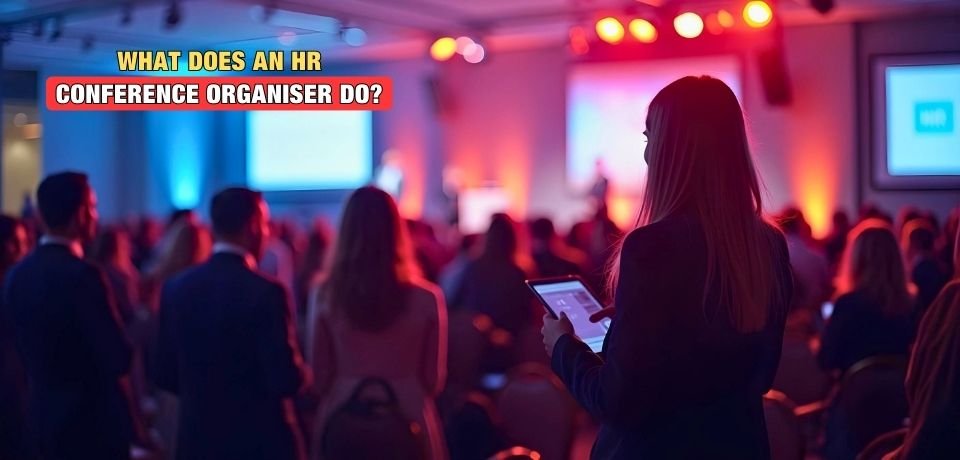A human resource conference is a significant gathering where human resource professionals discuss industry trends, challenges, and innovations. These events feature expert presentations, interactive workshops, and opportunities to network. If you’re wondering about the roles involved, you may be asking, What does an HR conference organiser do?
An HR conference organiser manages every aspect of the event, from planning and logistics to marketing and participant engagement. They ensure everything runs smoothly, align sessions with the conference’s goals, and develop an agenda that delivers value to attendees and contributes positively to the HR community.
Curious about the details of organizing a successful HR conference? Keep reading to find all the essential information—from event planning and promotion to managing stress—covering everything an HR conference organiser does to deliver impactful experiences.
Why Are HR Conferences Important for the Industry?
The purpose of HR conferences is to bring HR leaders together to share ideas and learn new strategies. These events let professionals meet other experts and discuss the latest trends in human resources. Attending conferences helps HR professionals gain knowledge to improve employee engagement and solve workplace challenges effectively.
Workshops, presentations, and panel discussions provide practical tools for HR growth at these conferences. Experts from different industries share unique tips and experiences, helping participants improve their HR practices. Interactive sessions help attendees ask questions and learn useful tips for hiring, retention, and workplace culture improvements.
Networking at HR conferences is an excellent way to connect with peers and build professional relationships. These events create opportunities to discuss challenges and explore solutions from different perspectives. By attending these conferences, HR professionals gain fresh perspectives and discover ways to help their organizations grow.
What Does an HR Conference Organiser Do?
The task of organizing an HR conference involves managing a wide range of tasks in order to ensure that it is an engaging and valuable event. From planning engaging sessions to managing logistics, every detail plays a crucial role in its success. Ensuring alignment with the event’s goals helps provide value for attendees and contribute to the industry’s growth.

Designing the Event Structure
Creating a structured agenda requires identifying relevant topics, session formats, and engaging speakers. A well-designed schedule ensures a balance between knowledge-sharing and networking opportunities. This approach caters to diverse attendee interests, maximizing participation. Keeping industry trends in focus helps maintain the conference’s relevance and fosters meaningful conversations that inspire innovative solutions.
Managing Logistics
Smooth logistics management is essential for delivering a professional event experience. Coordinating venue selection, technology setup, and attendee registrations ensures that all operational aspects are addressed. Providing convenient access to travel, accommodations, and dining options helps participants focus on learning and networking, free from logistical worries.
Promoting the Conference
Effective promotion is key to attracting the right audience. Marketing strategies, including email campaigns, social media ads, and partnerships, create awareness and excitement. Highlighting the event’s benefits and key speakers encourages attendance. A well-executed promotional plan ensures maximum reach, drawing in a diverse group of professionals interested in advancing their skills.
Building Strategic Partnerships
Collaborations with sponsors, media partners, and exhibitors help elevate the conference’s profile. Strong partnerships enhance the event by providing financial support and valuable resources. Offering unique opportunities for brand exposure and engagement ensures mutually beneficial relationships. These collaborations also add credibility and diversity to the event’s overall experience.
Engaging Participants
Promoting active engagement results in deep connections and stimulating conversations. Tools like live polls, Q&A sessions, and interactive workshops keep attendees involved throughout the conference. Creating opportunities for networking and collaborative activities allows participants to share ideas, learn from peers, and build professional relationships that extend beyond the event.
Tracking Attendee Feedback
Gathering feedback from attendees provides insights for refining future events. Surveys and feedback tools capture opinions on session quality, speaker performance, and the overall experience. By knowing participant satisfaction, these conferences can address current industry needs while improving the value they provide to HR professionals.
Analyzing Success Metrics
The success of the conference can be determined by examining key performance indicators such as attendance figures, session engagement, and sponsor satisfaction. Reviewing these metrics offers valuable insights into areas for improvement. Data-driven evaluations enable organizers to align future events more closely with attendee preferences and industry expectations.
Ensuring Financial Viability
Balancing the budget while maintaining quality is essential for a successful conference. Careful planning of expenses, securing sponsorships, and setting reasonable ticket prices ensure financial stability. Prioritizing cost-effective solutions without compromising the attendee experience ensures that the event remains sustainable and impactful for years to come.
Creating memorable events that motivate, inform, and unite professionals is a critical responsibility of HR conference organizers. By focusing on the objectives of HR conference initiatives, they contribute to shaping the industry’s future while meeting the needs of attendees.
How to Become an HR Conference Organiser?
It takes a special combination of event management, business expertise, and effective networking to become an HR conference organizer. The job offers diverse responsibilities that can be rewarding and impactful for professionals in human resources. Here are the essential steps to get started:

Step 1. Understand the Industry Needs
To successfully organize an HR conference, first understand the industry’s needs. Analyze current HR trends and challenges related to recruitment, leadership, and employee engagement. This will allow you to select relevant themes for your conference. Staying informed will help attract the right speakers and attendees to your event.
Step 2. Gain Experience in Event Planning
It is essential to gain experience in event planning. Start by assisting with smaller events or volunteering for roles in event management. Developing skills like budgeting, scheduling, and coordinating logistics will provide a strong foundation. You’ll also learn how to handle unexpected situations, which is essential for organizing a successful HR conference.
Step 3. Build a Network of HR Professionals
One of the most important parts of planning an HR conference is networking with HR professionals. Building relationships with potential speakers, sponsors, and industry leaders will give you access to valuable resources. Attend HR events, engage in professional networks, and create partnerships. A strong network will make your conference more influential and successful.
Step 4. Develop Strong Organizational Skills
Planning an HR conference requires a high level of organization. You will need to manage multiple tasks, such as booking venues, coordinating speakers, and handling registrations. Be prepared for last-minute adjustments and changes. Staying organized, using planning tools, and adhering to deadlines will help ensure your event runs smoothly and meets attendees’ expectations.
Step 5. Master Marketing and Promotion Techniques
Effective marketing is vital for attracting attendees to your HR conference. Utilize digital marketing strategies, including social media, email campaigns, and online ads, to reach your target audience. Create engaging content to build excitement and promote early registration. Partnering with industry influencers or sponsors can also boost your event’s visibility and credibility.
Organizing an HR conference is both challenging and rewarding. It requires industry knowledge, networking, and strong organizational skills. By mastering these areas, you can create an impactful event that adds value to HR professionals and organizations alike.
How Does an HR Conference Organiser Ensure Success?
Ensuring the success of an HR conference demands careful planning, clear objectives, and a vibrant program that captivates participants. Attention to detail and collaboration are key to creating an unforgettable experience that delivers value to attendees.
Prepare a Clear Vision and Goals
Establishing a conference’s purpose lays the foundation for its success. Clarity on objectives, target audience, and outcomes ensures all planning efforts align with the event’s vision. This structured approach enhances focus, making every decision purposeful and strategic.
Designing an Engaging Agenda
Incorporating interactive sessions, workshops, and diverse topics keeps attendees engaged. Collaboration with industry experts to find keynote speaker for HRM conference can benefit the program, offering fresh perspectives and expertise. A balanced agenda responds to varied interests, ensuring all participants gain value.
Effective Marketing and Promotion
Strategic promotion ensures a wide reach. Utilizing social media, email campaigns, and industry networks drives registrations. Highlighting unique offerings, like opportunities to connect with leading HR leaders, creates excitement, attracting professionals eager to learn and network.
Smooth Event Logistics
Attention to detail in logistics ensures a smooth experience. Timely communication with vendors, simplified registrations, and well-planned sessions reduce potential disruptions. A well-trained team supports these efforts, ensuring every element functions harmoniously.
Post-Conference Engagement Strategies
A successful event doesn’t end with its conclusion. Sharing recorded sessions, gathering feedback, and continuing discussions keep the momentum alive. These efforts enhance the event’s impact and foster long-term relationships with attendees and speakers alike.
Every successful HR conference is a blend of thoughtful preparation, creativity, and collaboration. By focusing on each critical aspect, organizers can deliver meaningful experiences that resonate with participants, inspiring connections and insights.
Tips for Handling Stress as an HR Conference Organiser
Stress management is a common challenge for HR conference organizers. It’s a fast-paced job that requires juggling multiple tasks. Managing stress effectively ensures smooth operations and a successful event.

- Prioritize Tasks: Set clear priorities by identifying which tasks need immediate attention and which can be deferred. This helps reduce overwhelm and allows you to focus on what matters most for the event’s success.
- Delegate Responsibilities: Assign tasks to your team members according to their strengths. Delegating ensures that work is spread out and prevents you from getting overwhelmed by handling everything yourself.
- Practice Time Management: Create a detailed schedule and stick to it. Time management helps keep tasks on track, making sure everything is completed on time without last-minute stress and panic.
- Stay Organized: Keep all documents, schedules, and contacts in one organized system. When everything is easily accessible, it reduces the time spent searching for information and helps you stay calm under pressure.
- Take Breaks: Stepping away from work for a few minutes throughout the day allows you to recharge. Breaks help clear your mind, reduce stress, and improve focus for the tasks ahead.
- Communicate Clearly: Effective communication with your team and stakeholders is crucial. Clear, concise updates will prevent misunderstandings, ensuring everyone knows their responsibilities and deadlines, which helps reduce stress.
- Stay Positive and Flexible: A positive attitude helps you stay resilient when things go off plan. Flexibility in adapting to changes will ease stress and allow you to find solutions without feeling overwhelmed.
Managing stress is an essential skill for HR conference organizers. Balancing responsibilities, staying organized, and maintaining a positive outlook ensures you can handle challenges while delivering a successful, stress-free event for all participants.
FAQs About What Does an HR Conference Organiser Do?
Here’s a brief introduction to the FAQs section to help you understand more about the role of an HR conference organiser. These questions address common queries and provide further insights into the tasks and responsibilities of someone in this key position.
What Skills Are Essential for an HR Conference Organiser?
An HR conference organiser needs a blend of skills such as strong organizational abilities, communication, multitasking, and problem-solving. They must also have a keen understanding of the HR industry, time management skills, and the ability to collaborate with various stakeholders, ensuring everything runs smoothly and efficiently.
How Do HR Conference Organisers Select Speakers?
Speakers are chosen by HR conference organizers based on their experience, fit with the event’s themes and capacity for audience engagement. They often seek individuals with experience in HR leadership, innovation, or industry-specific knowledge. Organisers may also look for speakers who can spark discussions and provide valuable insights.
How Do Organisers Ensure Attendee Satisfaction During the Event?
To ensure attendee satisfaction, organisers focus on creating a smooth experience by managing logistics, offering engaging sessions, and providing sufficient networking opportunities. They stay on top of any issues that arise, quickly addressing concerns, and ensuring that all aspects of the conference meet attendees’ expectations for value and enjoyment.
What Are the Key Challenges Faced by HR Conference Organisers?
Managing a large number of attendees, coordinating with several vendors, adhering to budgetary constraints, and meeting deadlines are all challenges faced by HR conference organizers. Balancing these factors while ensuring a smooth event requires effective time management, strong problem-solving abilities, and flexibility to adapt to unforeseen circumstances.
How Do HR Conference Organisers Handle Post-Event Follow-up?
After the event, organisers gather feedback from attendees and speakers to assess the event’s success and identify areas for improvement. They also share session recordings and post-event resources with participants. Staying engaged post-conference helps build long-term relationships and ensures that future events are even more successful.
End Note
A detailed process, planning, logistics management, event promotion, and attendance engagement are all part of organizing an HR conference. These efforts ensure a seamless and impactful experience for all participants, perfectly answering the question, What does an HR conference organiser do?
To achieve success as an HR conference organiser, stay organized, communicate effectively, and remain flexible when handling challenges. Focus on creating a valuable experience for attendees. With these tips, you can successfully deliver impactful events. Best wishes for your future in this exciting role!
